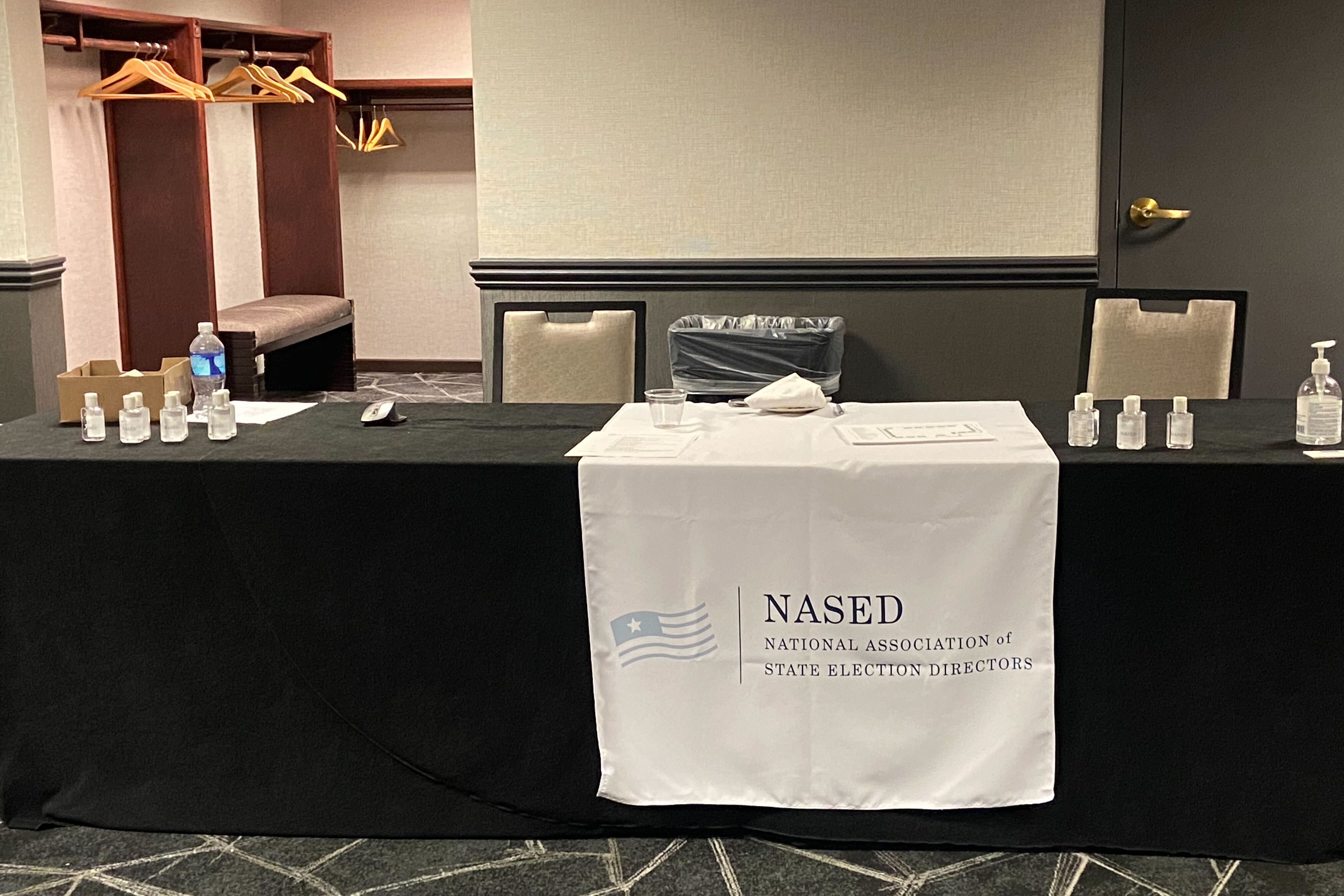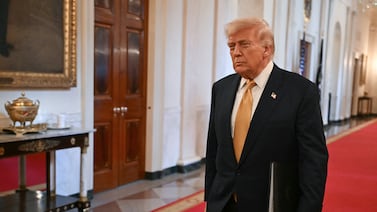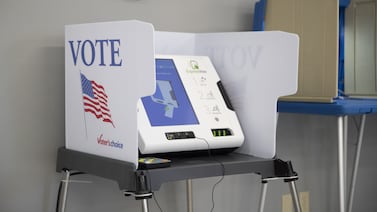A version of this post was originally distributed in Votebeat’s weekly newsletter. Sign up here.
This week, story editor Carrie Levine and I attended the National Association of State Election Directors conference in Madison, Wisconsin. Over the years, I’ve attended more than 10 NASED conferences in states across the country. I know! I probably need a hobby!
But here’s the upshot: I have never, ever seen security like this year, necessary because of the hostility, threats, and harassment aimed at election officials over the last two years.
NASED didn’t release an agenda in advance. Participants only found out exactly who would be attending and speaking when they checked in and received their name tags. The name tags were required for anyone entering the conference area, and participants were encouraged to take them off when not on the conference floor. The hotel posted no signage in the main lobby and made changes to its emergency exit plans. NASED hired two security guards to patrol the space; the U.S. Cybersecurity and Infrastructure Agency and the Federal Bureau of Investigation trained the guards and provided walking routes for them to use. The Madison Police Department did bomb sweeps throughout the facility each morning.
These aren’t elected officials or politicians. They’re low-profile government employees who juggle the complicated work of elections, and are used to doing it in anonymity.
The preparation for this began way back in April, when NASED Executive Director Amy Cohen did a walk-through of the space — at the Madison Concourse Hotel — accompanied by CISA’s protective security adviser (PSA) for Wisconsin and a cybersecurity adviser from the agency. And that was just to start. Representatives from a slew of other agencies tagged along — the FBI, the Wisconsin Capitol Police, local emergency management, local police, and local fire. They scrutinized every inch of the space, preparing to host dozens of election administrators in a state whose own elections administrator, Meagan Wolfe, has been under increasing scrutiny.
Cohen described Wisconsin, which NASED selected as the conference site earlier this year, as “a particularly challenging atmosphere.”
“It’s important that people feel safe and comfortable coming,” she said.” And, even if you personally haven’t been treated in this way, if you are going to hang out with someone who is, you want to know that you are safe.”*
While the security protocols were new, few were surprised by them. On the same day I spoke to Cohen in Wisconsin, three election officials and an election attorney testified before the House Committee on Homeland Security during a hearing about threats against election officials and election infrastructure. The Bipartisan Policy Center and the Alliance for Securing Democracy also released their own report on deterring such threats.
Common among the recommendations is setting security protocols in advance and relying on partnerships with federal authorities who have expertise. Cohen made sure to do that here: CISA coordinated the April walkthrough and provided its recommendations on security for free, though Cohen said NASED for the first time was forced to budget dollars to put many of their recommendations in place.
“The recommendations cost money, but you can make thoughtful decisions about how to move forward. This is the new normal and we have to deal with it,” she said. “Others holding conferences like this should budget similarly. The fact of the matter is that when we are all together, we are a target.”
Cohen encourages other states to reach out to CISA for help when they hold events for election officials. “It’s scary, and it isn’t my job. It’s not my job to know who to contact at state police in a state I don’t live in, and it was very helpful to be able to leverage CISA,” she said.
Kim Wyman, the former secretary of state for Washington and the current senior elections adviser to CISA, was stuck by the check-in table during Wednesday’s early afternoon panel, having inadvertently left her name tag in her hotel room. “Even I can’t get in without it,” she said.
The threats make daily life as an election official stressful, she said.
“You see your colleagues’ faces on the internet with targets over them,” she said, pausing. Tears welled up in her eyes. “I’m sorry! But the threats are personal. They are directed at secretaries of state, chief election officers, their families. It’s so unnerving.”
The NASED conference, Wyman said, was a good reminder that no one is facing this alone. “It’s comforting to just be able to commiserate a little,” she said. “This work is important and we chose this profession for a reason.”
That night, NASED attendees went off-site for an evening trivia contest. Cohen warned them that anyone going out for the night of fun had to take the chartered bus to the destination.
For security reasons, of course.
Back Then
People in Wisconsin may be pretty concerned about the fake plague of noncitizen voting these days, but they weren’t always. In 1848, the state pioneered the very concept of allowing noncitizens to vote. They had to be a resident of Wisconsin for two years, and have filed their first round of paperwork to apply for citizenship. At the time, Wisconsin had the highest percentage of noncitizen residents (a whopping 35 percent of the state’s residents were foreign-born). Michigan and Indiana soon followed with their own laws, opening the franchise up to noncitizens.
New From Votebeat
A conservative group in Texas is conducting a review of 300,000 ballots from the March 2020 Republican primary in Tarrant County. Under Texas law, these two-year-old ballots are now public records. It’s the first time Tarrant’s election administrator has accommodated a request this large by an outside group, but it likely won’t be the last. Reporting from Fort Worth for Votebeat Texas, Natalia Contreras covers what the group is up to and what it could lead to next.
A state-owned eight-seater airplane touched down in Yuma County to deliver a team from the Arizona secretary of state’s office to administer a crucial test to election machinery — one they hoped could help rebuild public confidence in elections. But first, election officials had to get people to show up. Rachel Leingang reports for Votebeat Arizona on the obscure logic and accuracy tests that could help the public trust voting machines again.
In Other Voting News
- A bill to overhaul the Electoral Count Act is headed to the U.S. Senate with bipartisan support. The legislation would raise the threshold for members of Congress to object to states’ electoral votes in presidential elections and would establish a three-judge panel to hear a candidate’s objections to a state’s electors, with an opportunity to appeal directly to the Supreme Court.
- Election officials are facing their toughest year yet, according to administrators who testified to the House Homeland Security Committee. Officials including secretaries of state described the “real world impacts” of violent harassment, cybersecurity threats, and conspiracy theories that are making elections harder to conduct.
- A coalition of sheriffs, supported by the right-wing group True the Vote, is organizing an effort to take charge of election investigations in their counties, Reuters reports. Calling themselves Constitutional Sheriffs, the group believes their law-enforcement authority supersedes local and federal authorities. Prominent members include Sheriff Dar Leaf of Barry County, Michigan, and Sheriff Calvin Hayden of Johnson County, Kansas, each of whom has been leading his own questionable local investigation of the 2020 election.
- Ohio’s Supreme Court invalidated the latest congressional map drawn by Republican lawmakers as an unconstitutional gerrymander. Nonetheless, the map will be used in the November elections because the May primaries were based on its districts. The Legislature will have to draw a new congressional map within a month to be used for the 2024 elections.
- Arizona Republicans have distributed warnings that ballots are being stolen or destroyed across the state, a claim county officials say is completely false. Officials say they haven’t heard any complaints of destroyed or damaged ballots from voters or the GOP.
- A Washington state GOP activist group is planning to monitor ballot drop boxes and is putting “warning” signs on drop boxes in Seattle, reports Oregon Public Broadcasting. Election officials are concerned that the signs and surveillance efforts are voter intimidation tactics.
- A Fulton County district attorney has notified 16 Georgia Republicans that they are under investigation and could face prosecution for acting as false electors and attempting to award Georgia’s electoral votes to former President Donald Trump after he lost the state. The Republicans are seeking in court to have the DA removed from the case.
- Complete results for Maryland’s primary elections this week have taken longer than usual. The delay is a result of a huge influx of mail-in ballots, which, by law, election workers couldn’t start counting until Thursday. Officials report that in bigger counties, results could take up to a week to fully tally.
Good News of the Week
By Christian McCann, Votebeat intern
Maine voters can now register electronically at the state’s Bureau of Motor Vehicles locations, following in the footsteps of 21 other states with similar programs. A law, signed in 2019 by Governor Janet Mills, allows Maine residents who apply to get or renew a driver’s license to register to vote or to update their voter registration electronically. They previously had the option to do it on paper, but that took longer to work its way through the voter registration system. Residents can still choose to opt out, but advocates of the law say that it eases access to voting and lowers entry barriers.
Jessica Huseman is Votebeat’s editorial director and is based in Dallas. Contact Jessica at jhuseman@votebeat.org.
*Correction, July 26, 2022: This article originally stated that Madison was chosen for the conference because Wolfe is the organization’s current president. Madison was chosen by a vote of the NASED executive board from a list of places where elections are not overseen by a secretary of state or lieutenant governor.






